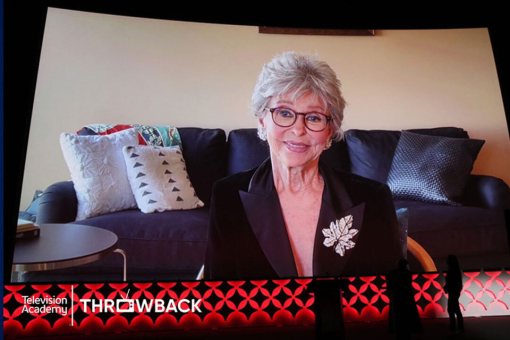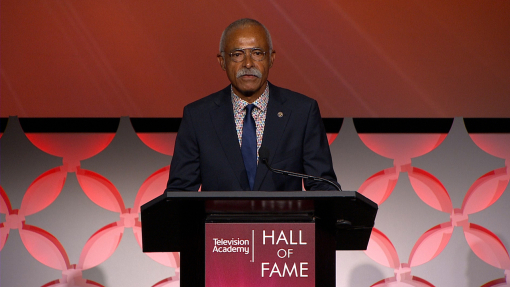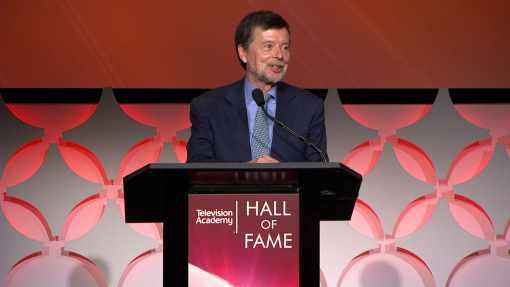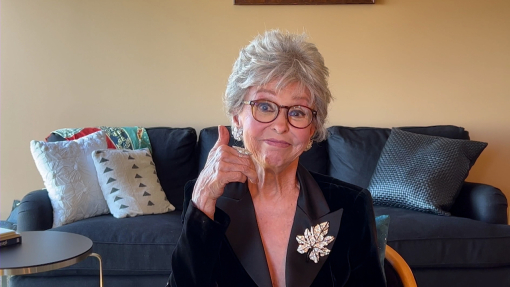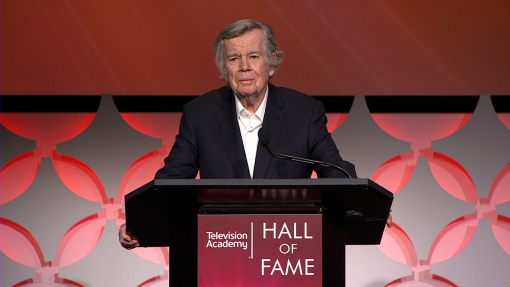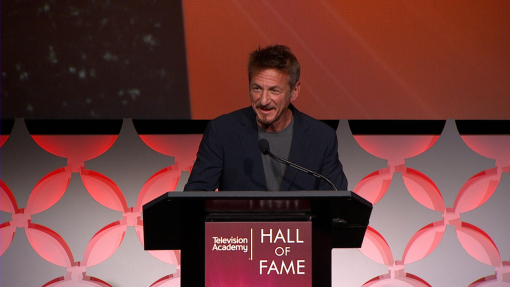Television history, she wrote.
Two-hundred and sixty four episodes. The highest-rated dramatic series on television for nine consecutive seasons — more consecutive seasons than any other series. The longest-running detective series ever. Two Emmy Awards, 36 Emmy nominations, four Golden Globes. And all starring an unflappable, dignified female character pushing 60 …
“My greatest success," said Angela Brigid Lansbury, flatly, "was my darling, Jessica Fletcher."
What's that? Murder, She Wrote's protagonist a greater triumph than a film career that includes Academy Award nominations for indelible roles in Gaslight, The Picture of Dorian Gray, The Manchurian Candidate — a greater success than a stage career that spans 60 years, punctuated by Tony awards for Auntie Mame, Gypsy, Dear World, and Sweeney Todd? A greater success than her enchanting, destined-to-be-classic animated turn as "Mrs. Potts" in Disney's Beauty and the Beast?
"Because it reached the greatest number of people," said Lansbury, Commander of the British Empire (by order of Queen Elizabeth, 1994). “If you judge success by how many people have seen you, and how many people like you, obviously I have to concede that Jessica Fletcher is my greatest success — although, as a role, she doesn't measure up in any way to other roles that I played in the theater, and, in some instances, movies. She just happens to be an enormously attractive, ingratiating character; a woman you like so much because she embodies so many qualities that people admire, and she's so staunch.”
Staunch, indeed. Mrs. Fletcher solved 286 murders, every Sunday night from 1984 to 1996 (64 in Cabot Cove and 58 in New York City, if you're keeping score), for a total audience estimated at 10 billion. And she did it all without the lifeblood, so to speak, of a lot of other detective shows: violence and mayhem. Murder, She Wrote was an intriguing parlor game, not a grisly whodunit.
It was an unlikely way to round out such a distinguished acting career — to star in a long-running smash-hit series (to say nothing of some fine made-for-TV movies like Mrs. 'Arris Goes to Paris and The Gift of Love: A Christmas Story) when you're practically a stranger to television altogether. Although Lansbury paid a few bills with 1950s appearances on Playhouse 90 and Studio 57, she calculatedly steered clear of the cathoid ray tube for decades.
"I sensed that it could be the burner on which I could burn out," she said in an interview from her Los Angeles home. “I didn't want to do that too early in my career, so I very carefully stayed away from television for years, after the 1950s … When movies and television finally loomed — thank God they did — it saved a lot of our bacon.”
What changed her mind?
“Quite honestly, I was sort of coming up on being 60. I guess I was 59, and Peter [her husband of 47 years, former agent and MGM production executive Peter Shaw] and I were in New York and I had toured long and hard in the theater. We decided we'd done enough touring. I'd just done Sweeney Todd on the road for a year at that point, and I thought, ‘If I'm ever going to do television, I should get into it now.’ We simply asked my agent to put me up for some good roles.”
It wasn't simple, however. The offers came — for ensemble parts of maids and cooks or benign, older nannylike women with British accents to support in sitcoms. Appalled, Lansbury swore she'd just stay in the theater — until Norman Lear came up with a sitcom idea that would have paired her with Charles Durning. The lady was seriously weighing the prospect when the pitch came via Universal and CBS for a one-hour "sort of American Miss Marple." Seeing as Lansbury had already played Marple (The Mirror Crack'd, which reunited her with National Velvet star Elizabeth Taylor), it seemed a natural. And it was. A good portion of mystery writer/sleuth J.B. Fletcher (the "B.," trivia buffs, is for Beatrice) is Angela.
"Angela did not want to play a killer," said Vince McAveety, who directed about 20 Murder, She Wrote episodes, “but Jessica is no Miss Goodie-Two Shoes, either. She's tough. And she has family ties. Even though her husband has passed away, she has nephews and friends throughout the States. Long before the women's movement, she had a very strong concept of what women could be and should be. And she's always the lady, always has a smile, and always a woman. I can't say enough about her. I miss her already!”
So do millions (billions?) of outraged Murder fans. When CBS switched Jessica from her landmark 8 p.m. (perpetually high-rated) Sunday slot and put her up against Friends on Thursdays, it seemed a foregone conclusion the show was finished. This was one killing Mrs. Fletcher would be powerless to prevent, or even solve. Lansbury made no bones about being devastated. Why couldn't they have let her go out gracefully?
“Between you and me, we were coming to the end of the line, anyway. But the distressing thing was the style in which CBS chose to disconnect me … to totally cut me off, which was a dreadful thing to do … People just won't let go of Murder, She Wrote! [which has an afterlife on USA cable]. They won't let me let go of it! When they see me, they say, ‘Oh, how could they do this to you?’ But the point is, I haven't walked away from Jessica. We're going to do two Murder, She Wrote two-hour movies per year, anyway.
If there seems more than a trace of concern for fans in her remarks, there is. Lansbury felt a tremendous responsibility to her audience — to the extent that it once might have cost her an Emmy (the lady has been nominated 11 times for Murder, but, incredibly, has not yet won). McAveety explains:
"There was a conception that I know Universal had of the possibility of bringing Angela together with another television star's show — I believe it was Columbo — in a two-hour movie," said McAveety. “Of course, they couldn't both play the same parts. She would have to play the heavy. As attractive as that may be — and incidentally, I've worked with Faye Dunaway on a Columbo, and she won an Emmy for that — Angela very unselfishly wouldn't even entertain the idea of working as a heavy, because of Jessica Fletcher and what her character meant to the American audience and the world, I'm sure. So, rather than Angela Lansbury possibly having the shoo-in Emmy in a great part, she passed the role up.”
Maybe, just maybe, Lansbury was also not totally enamored of the idea of playing heavies again, having long before made her cinematic name not on lyrical ingenues, but on sinister, cunning — well, downright evil — ladies. To the point of typecasting. How on earth did such a young, feminine, lovely, British Rose fall into playing, as a writer once suggested, "the Older Woman, the Other Woman, and the Awful Woman?" You remember — Nancy in Gaslight (1944), Judy Garland's tormentor in The Harvey Girls (1946), Walter Pidgeon's shrew of a wife in If Winter Comes (1948). The answer is telling:
"It is interesting," said Lansbury, in that familiar, lilting tone and cadence that is at once so civil and endearing. “I can't really answer that question beyond saying that I think I was a very observant young person, terrified of rejection, extremely sensitive. I think I described myself once to somebody as a skirt-hider-behinder. In other words, I used to hide behind my mother's skirts. I hid behind the draperies. I was terribly self-conscious and sensitive. I felt, as an actress, that I knew how to put people down because I was so sensitive to it myself. And being a good bully was wonderful to play, let me tell you that. The thing is not to take it too far. It's a matter of degree.”
For a skirt-hider-behinder, Lansbury has never shied away from dramatic presentation — and inspiration came early. Her beloved mum, Moyna Macgill, was a popular actress who took little Angie to the London theater a great deal ("that excited me greatly," she said), but it was her grandfather, the Right Honourable George Lansbury, who really planted the notion that arousing a crowd was a powerfully attractive thing to do. In fact, the towering, mutton-chopped Rt. Hon. Lansbury's example might just as easily have set Angela on a course toward politics; the man led the British Labour Party from 1931-35, and was a prominent pacifist who personally appealed to Hitler to cease aggression in Europe.
"As a child, of course," Lansbury remembered, “I really wasn't so much aware of the issues he was dealing with, but I was aware of the incredible sense of unity in the crowds listening to him in Albert Hall in London. I thought that was pretty terrific, you know? It wasn't so much what he was saying — it was how he swayed the crowd. His ability to put into words, and to make his case with an audience was quite something to see — not like the speeches today, you know, which are written by novelists and never by the politician himself.”
In short order, little Angie was giving speeches — at home, for the family, as a lark. (One, she remembered with a giggle, was an impassioned plea in support of public privvies.) Not all was so idyllic; her father, timber merchant Edgar Lansbury, passed away when she was only nine — and a few years later, World War II yanked her out of her house, and out of England. Moyna Macgill gathered up 14-year-old Angela, her twin brothers, Edgar and Bruce, and put them on the last boatload of refugees fleeing the London Blitz. The Lansburys lived in Westchester County, New York, for a year, and Angela commuted to the Feagin School of Dramatic Arts in Manhattan. She turned professional at age 16 with a cabaret act in Montreal. Sixteen, and in a new country?
"It was thrilling and terrifying! I didn't know what the devil I was doing," she laughed. “I remember, I opened with some ballads, and then I did a kind of musical special arrangement built around a song that Noel Coward had written called “I Went to a Marvelous Party” ... I sang like a French maid, and a Cockney Gracie Fields character and various voices — I bluffed my way through.”
Seeking greener thespian pastures, Mum moved the kids to Los Angeles and auditioned for movie work. A major part presently arrived — not for Miss Macgill, but for Miss Lansbury, who, at 17(!), was cast by George Cukor to play Nancy, the devious maid, in Gaslight. From there came a seven-year MGM contract, which ultimately led to a career that, at present, includes 44 films. The Manchurian Candidate (1963) is perhaps the movie Lansbury will best be remembered for; seldom has there been so formidable and interesting a portrayal of evil by a woman.
Ultimately, the itch to get back to the stage and entertain (and to leave behind those nasty women) prompted Lansbury to plunge headlong into Broadway, where (after a flop of a first effort, Anyone Can Whistle) she emerged triumphant in 1966 with Auntie Mame. She played Mame for two years on Broadway, earning the first of her unprecedented four Tonys, then went on to sellouts in Los Angeles and San Francisco. From there, it's pretty much a story of solid stage and screen work — Hamlet in London (1976) to The King and I (1978), Sweeney Todd and Death on the Nile (with Peter Ustinov, 1978) until — those taxing, but mostly merry years with Jessica Fletcher — years fondly recalled by the man who appeared on Murder more frequently (55 times) than any other of the series' 1,400 guest stars: William Windom (Dr. Seth Hazlitt).
"Angela is a remarkable person, a wonderful, gentle, fun, bright lady," said Windom, who first worked with Lansbury on stage in Hotel Paradiso in 1957. “I remember a scene we were doing (in Murder, She Wrote) in one of those stage cars, you know, with a screen behind it. There we were, early in the morning. And the line she was supposed to say to me was, ‘Oh, Seth, look out there at all those twinkling lights.’ And I say, ‘Yes, isn't it pretty,’ or something. But what she said was, ‘Oh, Seth, look out there at all those flashing knights!’ I said, ‘Yeah, the mooning maids aren't bad, either.’ And she broke up, and it was 20 minutes before we could do our lines.”
Lansbury is one of those rare stars — rare people — who seem to evoke nothing but effusive adoration from colleagues and friends. They sound more like fans. Director Delbert Mann, who worked with her in Dear Heart (1964), Dark at the Top of the Stairs (1958 and one of Lansbury's favorite pieces of work), and The Gift of Love (1984) declares unabashedly that he "longs" for the opportunity to work with her again. McAveety says bluntly, “The very first year I worked with her, I went to her and said, ‘I'm truly privileged,’ and I've never said that to any other actor I've ever worked with. And that's what I think about Angela. To be on the stage with her is a privilege, and I've been on the stage with many great stars, Jimmy Stewart, Henry Fonda.”
There's another aspect to Lansbury, as important as her acting resume — that is, her work as a philanthropist. Her myriad credits — from national spokesperson for Childreach to national chairman of the American Cancer Society and fundraising concerts for Aids Project Los Angeles — could easily be the subject of another entire article. Credit her Rt. Hon. grandfather with instilling in her a sense of charity. "He constantly gave money away and he could never turn anybody down," as she put it.
These days, the lady is actually enjoying watching a bit of television (she's a huge Seinfeld fan), and is increasingly concerned about the tube's content. (“I think it's out of control," she said, “and yet I worry about how to control it; to keep children away from the kind of violent, bad television which is a rotten example for them. I am appalled by the number of shows about marital discord, abusive parents, and so on. There's so little entertainment on television.”) As for being inducted into the Hall of Fame, she said, "to be there with Lucille Ball and all those wonderful people — I think that's really heavy stuff."
Aside from an occasional Murder, She Wrote movie, this one-time silver-screen heavy is headlong into other projects. In particular, she has finally teamed with Charles Durning — no, they're not reviving not that old proposed Norman Lear sitcom. They're shooting a CBS movie set for release this Christmas. She plays Mrs. Santa Claus.
George Cukor would never have believed it.
This tribute originally appeared in the Television Academy Hall of Fame program celebrating Angela Lansbury's induction in 1996.

